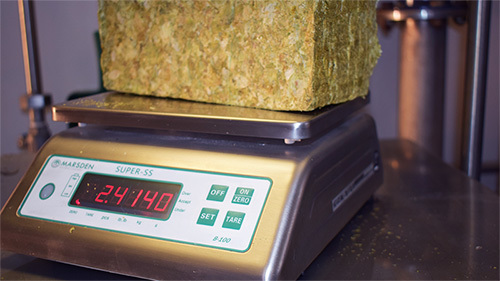Why should breweries use Trade Approved scales?

When breweries are pricing based on weight, using a Trade Approved scale is essential. Using unsuitable scale can result in a £1000 fine.
Weighing scales are used throughout the brewery processes - from weighing ingredients, to outgoing casks, bags of malt, through to the shipping out of consignment.
It’s important then that the scales used are suitable and meet requirements. But what are Trade Approved scales, and where and how should a brewery be using them? This blog explains…
What are Trade Approved scales?
It is a legal requirement that Trade Approved weighing equipment is used when goods are bought or sold based on their weight.
Trade Approved scales are also referred to as Class III Approved scales, Legal for Trade scales and stamped scales. The legislation protects the customer and rigorous testing ensures the scales are built, tested and verified to a certain standard. Two different approved scales weighing the same item should give the same weight reading.
Browse our full guide on Trade Approved scales here.
Do I need Trade Approved scales?
The Non-automatic Weighing Instruments (NAWI) Directive 2014/31/EU states that ‘determination of mass for commercial transactions’ and ‘for the purposes of direct sales to the public and the making-up of pre-packages’ requires such a scale.
Craig Fisher, Senior Trading Standards Officer at Sheffield Trading Standards said, “Trade Approved scales must be used for any weighing operation which determines the final quantity of goods being sold, checking packages made up in accordance with Packaged Goods Regulations, use to determine tolls or charges or bonus payments.”
How do you know if your brewery scale is Trade Approved?
Legal for trade scales can be identified by their data plate, found on the bottom or side of the scale. This should feature ‘III’ in a circle (indicating it is Trade Approved).
Class III Approval is also shown on the EC type-approval certificate, which is provided with the scale. This document also shows the manufacturer’s name and scale capabilities.
Marsden recommends that all relevant document - such as calibration certificates and Declaration of Conformity - are kept safe in case they are needed during inspections.
How do Trading Standards inspect brewery scales to ensure they are Trade Approved?
Craig Fisher continued, “In general, Trading Standards Officers will try to carry out a multi-disciplined inspection including Food Standards and Metrology. Lower capacity weighing machines will be tested, but higher capacity machines may require a separate visit.
“Inspectors will check the scales to ensure they have the correct markings if they are deemed to be used for trade. They should have been manufactured in accordance with appropriate type approval or examination certificate and be passed as fit for use for trade by an Inspector of Weights and Measures or an approved verifier. They may also be qualified by an approved manufacturer or notified body.
“As well as the manufacturer’s details, the ‘M’ mark, accuracy class, capacity, scale interval and minimum load, inspectors will assess whether the scale is suitable for its intended purpose and are sufficiently accurate depending upon the packages they are checking. They should also be situated in a suitable environment.”
When do breweries need to use Trade Approved scales?
Craig continued, “Any checks that are carried out in breweries to ensure the volume being sold is accurate, must be done using Trade Approved equipment. The weighing of ingredients to be added to the recipe however is not controlled weighing (i.e. the scale here does not need to be Trade Approved)."
Breweries need to use Trade Approved scales when bottling, if the volume is shown on the bottle, and the price is based on the volume; or when despatching, upon the packages they are checking.
Which Trade Approved scales should breweries use?
Use the same scale for a number of tasks
Many breweries - particularly micro breweries - opt for a weighing scale that needs to perform multiple tasks. A flexible weighing scale can be used for weighing small amounts of ingredients during the early stages of the brewing process to weighing out sacks of malt or buckets.
The Marsden B-400 is a Trade Approved IP67 rated scale. The stainless steel casing makes it easy to clean - and it looks the part. It is a Trade Approved alternative to the B-100 waterproof scale, our best-selling scale for breweries.
Pricing goods based on volume
When it comes to weighing the bigger stuff, such as when despatching filled casks based on the quantity of beer in the cask, you need an approved scale with a larger base.
The MSS with the JIK-APP Indicator is a Trade Approved bench scale with 304 grade stainless steel platter and IP67 rated indicator, ideal for brewery environments. Further, the JIK indicator can be connected to a printer or PC, using the Scale to PC USB Lead - meaning you can keep a record of your weights.
Shipping out
Larger breweries may want to opt for a Trade Approved scale that’ll take care of multiple items in one go.
This stainless steel platform scale can be paired with the I-100SS-APP indicator to make a Trade Approved platform scale. This scale features a 304 food grade stainless steel base which is certified IP68 waterproof. The stainless steel indicator is IP65 rated. Optional ramps mean a pallet truck can be rolled onto the scale so that a pallet can be weighed. The scale’s IP68 rating means they can be washed down every day - perfect for weighing out-going shipments at your brewery.
“We’ve found this scale to be the fastest and easiest way to weigh 1,000 litre cartons of apple juice. And it can be washed down,” said Jon Normal of Aspall Cyder.
For more information on IP ratings, click here.
For more help finding the right weighing scale for your brewery, read our brewery buying guide. For more information on any of our brewery scales or for information, call 01709 364296, contact us here or via our web chat facility.